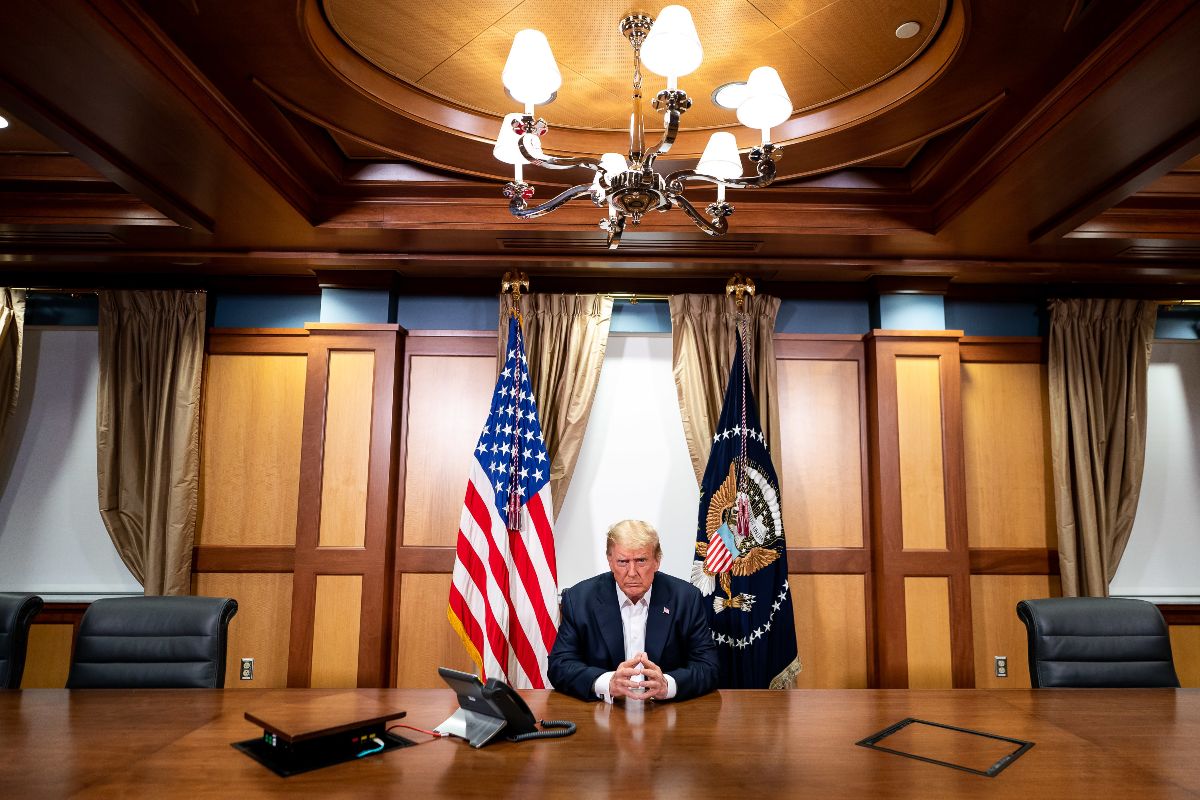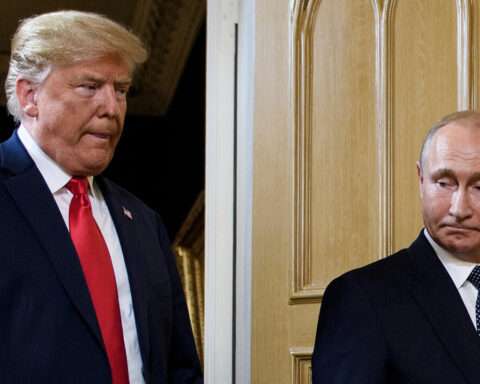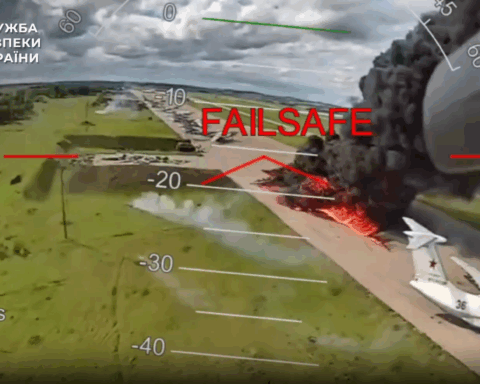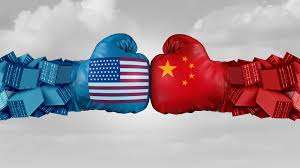In a recent interview with Newsmax, U.S. President Donald Trump speculated that Russia could be intentionally delaying peace efforts in its ongoing war with Ukraine, despite a potential desire to end the conflict.
Trump’s remarks have reignited discussions about Moscow’s true intentions as the war nears its third year, with both Ukrainian and Western leaders expressing skepticism about Russia’s commitment to a genuine ceasefire. This article delves into the complexities of Russia’s stance, Trump’s diplomatic push, and the broader implications for Ukraine and global security, drawing on insights from major media outlets and the evolving narrative around the conflict.
The statement came during a Tuesday night interview on March 26, 2025, when Trump told Newsmax, “I think that Russia wants to see an end to it, but it could be they’re dragging their feet.” His comments followed a flurry of diplomatic activity, including U.S.-brokered talks in Saudi Arabia aimed at securing a ceasefire in the Black Sea region. These negotiations have yielded mixed results, with Russia conditioning its participation on the lifting of Western sanctions—a demand that has fueled speculation about its sincerity. As Trump positions himself as a peacemaker, his observations highlight the challenges of negotiating with a Kremlin that has a history of broken promises.
The Context of Trump’s Claim
Trump’s assertion that Russia might be stalling is not an isolated opinion. Ukrainian President Volodymyr Zelenskyy has repeatedly accused Moscow of manipulating ceasefire agreements to buy time for military regrouping. According to CNN, Zelenskyy warned that any pause in fighting without ironclad guarantees could allow Russia to rearm and resume its offensive with greater force. This fear is rooted in historical precedent: Russia’s annexation of Crimea in 2014 and its violation of the Minsk Agreements in 2015 and beyond have left Ukraine and its allies wary of Moscow’s intentions.

The New York Times reports that Russia’s battlefield gains—however incremental—may also explain its reluctance to commit to peace. With recent advances in the Donetsk region, including the capture of Toretsk, Moscow might see little incentive to halt its momentum. Trump’s suggestion of “dragging feet” aligns with this analysis, hinting that Russia could be leveraging its military position to extract concessions in negotiations. Meanwhile, Fox News notes that Trump’s approach hinges on his belief in personal diplomacy, particularly his rapport with Russian President Vladimir Putin, which he claims gives him unique leverage to broker a deal.
Russia May Be ‘Dragging Feet’ on Achieving Peace in Ukraine, Trump Tells Newsmax
Delving deeper into Trump’s Newsmax interview, his exact words paint a nuanced picture: “I think Russia would like to see it end and I think Zelensky would like to see it end, at this point, but it could be they’re dragging their feet. I’ve done it over the years.” The phrase “dragging their feet” suggests a deliberate delay, a tactic Trump himself admits to using in past negotiations. This candid acknowledgment adds a layer of intrigue—does Trump see Putin employing a strategy he recognizes from his own playbook?
NBC News highlights a specific development that may have prompted Trump’s remark: Russia’s response to a U.S.-brokered Black Sea deal. Hours after the White House announced an agreement to ensure safe navigation and halt attacks on energy infrastructure, Russia launched a barrage of drones on Ukrainian targets, as reported by CNN. This contradiction between words and actions has fueled accusations of bad faith. Ukrainian officials, per the BBC, labeled the attack a clear sign that Moscow is “not serious” about peace, reinforcing Trump’s suspicion of stalling tactics.
The Diplomatic Push and Its Hurdles
Trump’s renewed focus on ending the Ukraine war stems from a campaign promise to resolve the conflict swiftly—once boasted as achievable in “24 hours.” The New York Times points out that this pledge has proven overly optimistic, with no significant progress since his election in November 2024. Yet, his administration has ramped up efforts, appointing retired Lt. Gen. Keith Kellogg as a special envoy to Ukraine and Russia. Fox News reports that Kellogg has outlined a 100-day goal for a peace deal, emphasizing a “solid and sustainable” resolution to halt the carnage.
However, the path to peace is fraught with obstacles. NBC News notes that Russia’s exclusion of Kellogg from key talks in Saudi Arabia—due to his perceived pro-Ukraine stance—signals Moscow’s resistance to U.S. mediation. The Kremlin’s insistence on lifting sanctions, as covered by CNN, further complicates matters. These conditions clash with Ukraine’s position, which demands the return of all occupied territories—a maximalist goal that Kyiv, per the BBC, refuses to abandon despite its strained military resources.
European allies, sidelined in U.S.-Russia bilateral talks, also express unease. The BBC reports French President Emmanuel Macron’s call for a truce that avoids Ukraine’s “surrender,” coupled with security guarantees like European peacekeeping forces—an idea Russia has flatly rejected, according to NBC News. Trump’s openness to European involvement, as noted by Fox News, contrasts with his insistence that the U.S. should not bear the burden alone, reflecting a broader shift in his foreign policy outlook.
Russia’s Strategic Calculus
Why might Russia be stalling? Analysts across media outlets offer several theories. The New York Times suggests that Putin seeks a “wider victory” to justify the war’s staggering human and economic toll—estimated at 700,000 Russian casualties by U.S. and British officials, per NBC News. Freezing the front lines now, as proposed in some ceasefire plans, might lock in gains but fall short of the decisive triumph Putin craves to cement his legacy.
Fox News security experts argue that Russia’s battlefield success—however slow—reduces its urgency to negotiate. The capture of Pokrovsk could open pathways to key Ukrainian cities like Dnipro, giving Moscow a stronger hand. Meanwhile, CNN points to Russia’s alliances with China, Iran, and North Korea as a buffer against Western pressure, diminishing the impact of sanctions and emboldening Putin to prolong the conflict.
The BBC adds another dimension: Russia’s history of deceit. From false flag operations to broken truces, Moscow’s track record—vividly recalled in its 2022 invasion despite prior denials—casts doubt on its reliability as a negotiating partner. Trump’s comment about “dragging feet” may thus reflect an awareness of this pattern, even as he pushes for a diplomatic breakthrough.
Ukraine’s Perspective and the Human Cost
For Ukraine, the stakes could not be higher. The BBC reports that relentless Russian assaults have depleted Kyiv’s ammunition and manpower, making a ceasefire tempting yet risky. Zelenskyy’s insistence on reclaiming all territory, as covered by CNN, stems from a fear that any pause could cede 20% of Ukraine permanently—a loss he deems unacceptable. NBC News quotes a Ukrainian soldier lamenting, “We don’t have much to say about it,” underscoring Kyiv’s weakening position as Russia grinds forward.
The human toll is staggering. Fox News cites millions displaced and hundreds of thousands dead or wounded on both sides, a carnage Trump seeks to end. Yet, as the New York Times notes, the war’s brutality has hardened attitudes, making compromise elusive. Ukrainians, per the BBC, view peace talks with suspicion, fearing a repeat of past betrayals where Russia used truces to regroup.
Trump’s Role: Peacemaker or Pragmatist?
Trump’s rhetoric blends optimism with pragmatism. His Newsmax interview reflects confidence in his ability to sway Putin, a belief echoed by Fox News commentators who laud his “peace through strength” approach. Yet, the New York Times critiques his lack of a detailed plan, noting that his team has yet to present a concrete proposal to Kyiv or Moscow. NBC News suggests that Trump’s leverage—threats of sanctions or reduced U.S. aid—may not suffice against a Kremlin buoyed by battlefield gains and international allies.
The BBC highlights a potential rift with Europe, where leaders like Macron push for a more structured peace process. Trump’s willingness to let Europe shoulder costs, as per Fox News, signals a shift from his first term’s isolationism to a burden-sharing model—though his refusal to commit U.S. troops, per NBC News, keeps his stance firmly pragmatic.
Looking Ahead: Peace or Prolonged Conflict?
As of March 26, 2025, the prospect of peace remains uncertain. Trump’s observation that Russia might be “dragging its feet” encapsulates the central challenge: can Moscow be trusted to negotiate in good faith? The New York Times warns that a collapsed truce could sour Trump on Ukraine, risking further aid cuts. CNN envisions a scenario where misinformation and small clashes derail progress, a tactic Russia has mastered.
Yet, hope persists. Fox News cites White House Press Secretary Karoline Leavitt’s claim that “we have never been closer to peace,” buoyed by Ukraine’s acceptance of a 30-day ceasefire proposal. Whether Russia follows suit—or continues to stall—will test Trump’s diplomatic mettle and shape the war’s next chapter.






